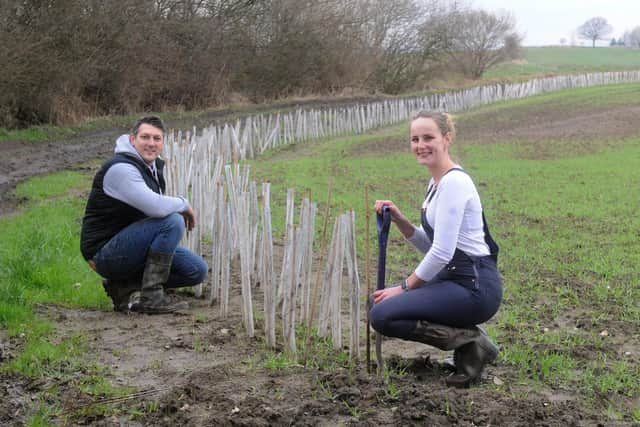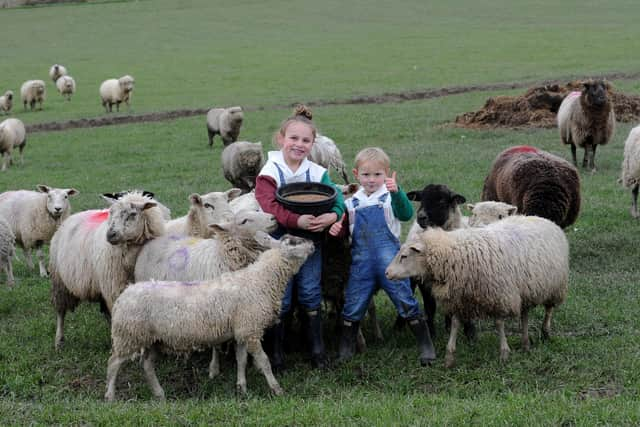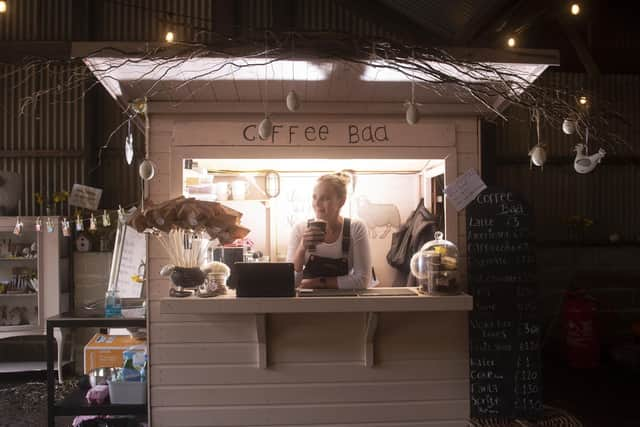Farm of the Week: First-time Yorkshire farmers who have opened a baby lamb feeding experience
Herbie’s parents are Lucy and Chad Stevens who took over Horncastle Farm from Lucy’s grandfather Ken in 2014. They had no previous farming experience other than helping Ken on his last harvest and, at the time, the farm was wholly an arable concern over its 200 acres.
Lucy and Chad kept it largely the same until two years ago when they tried taking their then three and one year old sons, Herbie and Arnie, to bottle feed some lambs on a farm.
Advertisement
Hide AdAdvertisement
Hide Ad“What followed sees us going in the direction we are today,” says Chad. “We stumbled on to livestock because of our children and now we are developing it into part of the farming enterprise.


“When we couldn’t get into the farm to do the bottle feeding Lucy and I thought, we are farmers, we have fields, why don’t we get a couple of orphan lambs for the boys and feed them as pets. We bottle fed them and they ran around like part of the family.
“Family and friends came around and said we should open up for families with children to come and visit.
The Horncastle Farm Bottle Feeding Baby Lambs Experience was born last year and this year it has been extended with a Bottle Feeding Baby Goats Experience and a Coffee Baa for the parents and children to enjoy refreshments too.
Advertisement
Hide AdAdvertisement
Hide Ad“We picked up batches of orphan lambs last year and this year,” says Chad. “We’ve currently got 33 baby lambs from three farms and four baby pigmy goats, kids.


“We’re now growing our own sheep flock as we’ve pretty much kept everything we bottle fed last year and this year we also have about 30 ewes to lamb. We’ve had six lambs so far from them. The breeding ewes we have are Swaledales, Valais Blacknose-crosses and pedigree Southdowns that we put to our new pedigree tup Wolfie. The rest of the flock is a right royal mix of Texels, Mules, Zwartbles and Blue Texels.
Lucy and Chad have since added cattle and pigs to offer a real experience of farm livestock for children and all ages to enjoy.
“We now have five Dexter girls we got from Whirlow Farm in Sheffield,” says Lucy. “They came to us in-calf in December. We lost the first calf and I was in floods of tears but Flower, the mummy who lost the calf, now has an orphan Highland calf called Oliver. Flower doesn’t seem to notice that he’s five times bigger than her calf. We’ve also just had our first Dexter calf.
Advertisement
Hide AdAdvertisement
Hide Ad“We also now have two Saddleback pigs called Pearl and Prudence who we may possibly breed from. They’re six months old.


“The boys love all the animals on the farm. Chad and I like them too. Opening for the public to visit us for other events as well as bottle feeding lambs does appeal, we’ve already got a little coffee bar while events are running. We also open it when we have our pumpkin festival which we started last year. It’s lovely seeing the enjoyment everybody gets from being around animals.
“We also want to be able to do the whole high welfare, traceable meat thing, which one day we will, once I’ve got over my initial struggle at sending our cattle and sheep to market.
“One of our visions is to provide an experience particularly for local people. It’s nice to offer something to those in the villages nearby that’s affordable and different to the norm,” says Chad.
Advertisement
Hide AdAdvertisement
Hide Ad“We didn’t set off on this journey to be farmers and all of a sudden you’re doing it and making decisions. We live and breathe it, we get things wrong, but because we don’t come from a farming background we maybe think differently to others who’ve done it all their lives.
“Our absolute focus is to have a purpose for everything on the farm and to make things work for us. An example would now be that a crop of wheat in one of our fields might yield 26-27 tonnes if it was a ridiculous yield, but if we open up the farm more for visitors and have sheep in that same field it might actually be more productive.
“We had a field of barley last year that we separated off and put sheep on a strip and grazed it intensely and it went through its year with no fertiliser, no spray and the yield was no different to the crops either side of it which had all of that. I’m not saying it was a perfect approach or I would want to do it across the whole farm, but as a first foray it made a difference.
After a few good years of arable cropping, with Lucy the combine and tractor driver on the farm this winter has proved horrendous, as Chad explains.
Advertisement
Hide AdAdvertisement
Hide Ad“The weather has been so bad that we’ve only been able to plant 20 acres of the 65 acres of winter wheat we’d had planned; our whole acreage of oilseed rape has failed across all four fields, because of flea beetle and grass, and will all be ploughed out and put to spring malting barley Laureate.
“We’ve been fortunate with oilseed rape other years and we always seem able to grow winter barley and spring barley. Our winter barley variety Kingsbarn really gets itself going and does a good job of smothering out some of the grass weeds. We’ve had good success with spring barley if it gets established right and it can get just as good a yield as winter barley.
“We are on predominantly heavy clay soil and once the rain comes we can’t get on the land at all, which is where we are at now. The land is that saturated, so that’s why our cropping this year will change to spring barley and we are exploring some of the SFI stuff around other crops and herbal leys.
“Having a wholly arable farm feels to us that you are constantly gambling with your life over weather conditions and volatile markets, so if with livestock and diversification we can mitigate that level across several enterprises and benefit the land as well it feels like a better fit for us.
Advertisement
Hide AdAdvertisement
Hide AdLucy and Chad have embraced regenerative farming and are currently in the process of planting 4000 hedge plants, plus they are trying to bring greater organic matter in their soil by putting grass into their rotation and planting herbal leys and having sheep grazing.
“We are trying to manage a ryegrass problem,” says Chad. “And we learned a few lessons about growing pumpkins last year.
“We’re on a very steep learning curve,” says Lucy. “I was a beauty therapist for 14 years, but seeing our boys growing up here is the best therapy of all. They love it.
Check out Herbie’s starring role on: https://www.youtube.com/@horncastlefarm
Comment Guidelines
National World encourages reader discussion on our stories. User feedback, insights and back-and-forth exchanges add a rich layer of context to reporting. Please review our Community Guidelines before commenting.